Jessica Knauss's Blog, page 43
October 8, 2012
The Next Big Thing: The Seven Noble Knights of Lara
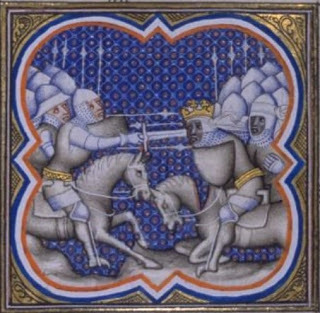 The latest game for authors in the blogosphere is to tag each other for The Next Big Thing. Kim Rendfeld, who writes early medieval fiction, tagged me. The authors answer a list of questions about their works in progress in anticipation of sharing their work with the world!
The latest game for authors in the blogosphere is to tag each other for The Next Big Thing. Kim Rendfeld, who writes early medieval fiction, tagged me. The authors answer a list of questions about their works in progress in anticipation of sharing their work with the world! The questions:
What is the working title of your book?
The Seven Noble Knights of Lara. It recently occurred to me that using the medieval title might not satisfy some modern readers, who might expect said seven knights to play an even larger role than they do, but I have no idea what a better title would be.
Where did the idea come from for the book?
I read the "historical accounts" of this story in grad school and it has no ceased to haunt me. The historical accounts are based on a lost epic poem, and perhaps it's that lostness that fascinates me.
What genre does your book fall under?
Historical fiction. There are some fantasy elements in the original that I'm explaining with realistic causes.
Which actors would you choose to play your characters in a movie rendition?
I would like unknown actors to play the young characters. I'd die of happiness if Mandy Patinkin played one of the older characters -- perhaps the Count of Castile, Muño Salido, or even Ruy Blásquez, the evil man himself. Zaida should be played by someone as beautiful as Aishwarya Rai, but none of my other favorite actresses fit the type my characters need.
What is the one-sentence synopsis of your book?
Teaser: A medieval epic with strong women, valiant knights and a bloody cucumber.
Synopsis: When a tenth-century noble Spanish woman suffers a gross affront at her own wedding, her blindly loyal husband wreaks a bloody revenge that will devastate the nation with an unstaunched conflict spanning 15 years. (Needs more work.)
Will your book be self-published or represented by an agency?
I'm deciding between aiming for a small press or trying to get a literary agent. Being a publishing world "insider," I understand my options, but am not sure what will work best for me.
How long did it take you to write the first draft of your manuscript?
I started in 2007, but that draft was so bad I don't even count it. This true first draft has occupied me constantly since early 2011, and I hope to finish before the turn of 2013.
What other books would you compare this story to within your genre?
Within the genre, I think it's most similar to The Cross and the Dragon by Kim Rendfeld, but I hope to be able to read some more medieval fiction and flesh that out a bit. In my "pitch," I compare the revenge dynamics to nothing less than The Godfather and the amazing historical details to María Rosa Menocal's The Ornament of the World. That's pretty bold for me, but they told me I had to pick something, so...
What else about your book might pique the reader’s interest?
There's love, lust, insanity and loads of rage. A couple of characters I created from scratch to support the main characters have captured by beta readers' hearts. You won't want to miss lovely, downtrodden Justa, handsome Adalberto, and practical, inscrutable Yusuf. Different attitudes about the monetary value of human life and the role of sex will fascinate any curious soul. Readers may also find descriptions of opulent, glittering, medieval Medina Azahara and cataract surgery that's not much less sophisticated than today's to be of interest.
I tag the following Next Big Things:
Tonya Marie Burrows, author of thrilling romantic suspense
Published on October 08, 2012 00:06
October 6, 2012
Crossroads
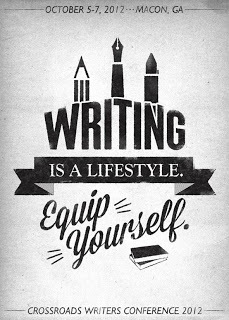
Today I'm at the Crossroads Writers Conference in lovely Macon, Georgia, to shake off some of the isolation inherent in writing and be inspired. The keynote speaker is Chris Baty, founder of NaNoWriMo, and if there's one person in the world who can tell me how to finish my novel this year, it must be he!
Published on October 06, 2012 00:23
Crossroads and an Interview

Today I'm at the Crossroads Writers Conference in lovely Macon, Georgia, to shake off some of the isolation inherent in writing and be inspired. The keynote speaker is Chris Baty, founder of NaNoWriMo, and if there's one person in the world who can tell me how to finish my novel this year, it must be he!
On a somewhat related note, I'm also being interviewed today at J. J. Johnson's blog about the rhino stories! Enjoy!
Published on October 06, 2012 00:23
October 3, 2012
Have You Peaked or Are You Piqued? More Homophones

Here's a triple homophone for you.
Peak first came into written English in the middle of the sixteenth century. As a noun, the picture above illustrates it well: the highest point of anything, in the literal or figurative sense. The verb is used to describe someone or something reaching its literal or figurative highest point: The quality of printing peaked with the Gutenberg Bible and has been going downhill ever since.
Pique has been a member of English for nearly as long, but still maintains the look of its French origin. As a verb, it means to provoke, often to provoke to irritation: Their bad grammar piqued her to distraction. More commonly, the verb is used in the passive voice: She was piqued to distraction by their bad grammar. It also means to excite, as in the set phrase "to pique one's curiosity." The noun refers to the state of irritation, resentment or wounded pride resulting from having been piqued: The grammar teacher's students sent her into a fit of pique never before seen in the history of the school.
And of course, the last peek has to do with looking at something for a short amount of time. Few seem to have trouble spelling this one, perhaps because of things like peek-a-boo and "sneak peeks."
So as you can see, the three words have little to do with each other, unless someone reaches the peak of his pique as a result of being peeked at.
Published on October 03, 2012 00:38
October 1, 2012
Medieval Underpants (Review)
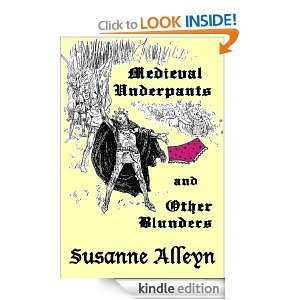 Medieval Underpants and Other Blunders: A Writer's (and Editor's) Guide to Keeping Historical Fiction Free of Common Anachronisms, Errors, and Myths by Susanne Alleyn is the single most useful book I've read on the craft of historical fiction. It's presented in a compulsively readable style that made it hard to put down. Riveting and beautifully logical, the book's mantra is never to assume you know something. But don't take my word for it. Let Susanne Alleyn tell you why. I picked this up after I read a highly entertaining excerpt about misconceptions of the Terror of the French Revolution that was also full of good historical research methods. That's her favorite topic, but she's just as passionate about all the other details.
Medieval Underpants and Other Blunders: A Writer's (and Editor's) Guide to Keeping Historical Fiction Free of Common Anachronisms, Errors, and Myths by Susanne Alleyn is the single most useful book I've read on the craft of historical fiction. It's presented in a compulsively readable style that made it hard to put down. Riveting and beautifully logical, the book's mantra is never to assume you know something. But don't take my word for it. Let Susanne Alleyn tell you why. I picked this up after I read a highly entertaining excerpt about misconceptions of the Terror of the French Revolution that was also full of good historical research methods. That's her favorite topic, but she's just as passionate about all the other details.The most fun sections are the examples she takes from real books and movies in order to tear them down. Who can resist laughing at the mistakes of other people? Of course, after you're done laughing, if you're writing historical fiction, you're left with the vertiginous realization that your current draft commits many of the same errors. At least you'll have read this book and learned how to correct such blunders before an editor sees it!
This book is also highly recommended for non-writers who like to read about the tasty morsels of history that don't get covered in straight history books, such as, how women relieved themselves before the advent of public restrooms and why medieval teeth weren't rotten.
Published on October 01, 2012 00:52
September 26, 2012
Rhino Thanks
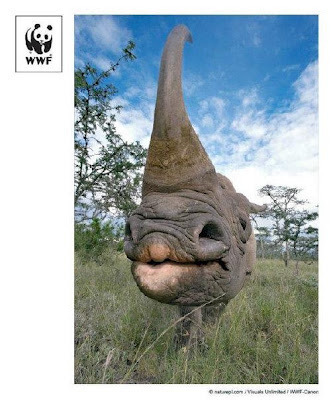 A grateful kiss from a black rhino.Thanks to everyone who has purchased Rhinoceros Dreams already... all one of you. Not to worry, it's still September and all proceeds from the book will benefit real-life endangered and orphaned rhinos.
A grateful kiss from a black rhino.Thanks to everyone who has purchased Rhinoceros Dreams already... all one of you. Not to worry, it's still September and all proceeds from the book will benefit real-life endangered and orphaned rhinos.Read all about it here.
Get it (cheap!) here and here and soon, many other places. Note the great review at Amazon or Goodreads!
Thank you!
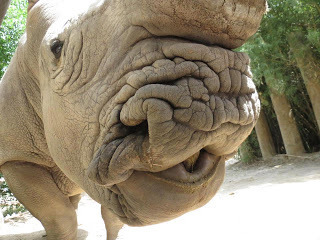 A grateful kiss from a white rhino.
A grateful kiss from a white rhino.
Published on September 26, 2012 00:01
September 24, 2012
The Grail Knight as Inspiration
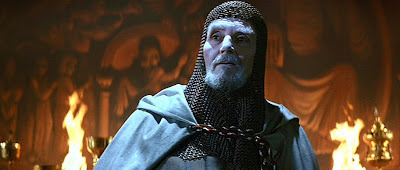 WTF? You're going to throw my cup in a crevasse, wreck my home, and then just leave me here? Really?They were showing the Indiana Jones movies on cable, as they do, and I always like to see if I can turn to that channel only while they're in the cave of the holy grail so I can see the Grail Knight. I just adore that guy. The first time I saw Indiana Jones and the Last Crusade, the prospect of being able to talk to someone from the fourteenth century, to span that unspannable chasm of 600 years, thrilled me beyond belief. I wondered why we had bothered with all the chase scenes -- why wasn't the whole film all about the mind-blowing conversations a twentieth-century person could have with this guy? Surely that must be the true holy grail.
WTF? You're going to throw my cup in a crevasse, wreck my home, and then just leave me here? Really?They were showing the Indiana Jones movies on cable, as they do, and I always like to see if I can turn to that channel only while they're in the cave of the holy grail so I can see the Grail Knight. I just adore that guy. The first time I saw Indiana Jones and the Last Crusade, the prospect of being able to talk to someone from the fourteenth century, to span that unspannable chasm of 600 years, thrilled me beyond belief. I wondered why we had bothered with all the chase scenes -- why wasn't the whole film all about the mind-blowing conversations a twentieth-century person could have with this guy? Surely that must be the true holy grail.That's just one reason I ended up studying the Middle Ages: to send people from today back in time, to put a bridge across the fourth dimension, so we could experience how things had happened, what things looked, tasted, and smelled like, and what people felt about it all. It took quite a bit more popular culture and college courses before I realized this destiny, and much, much more school before I began to grasp what would be necessary to strive toward that goal. If you're interested, I'll tell you about it.
This last time I watched that portion of the movie, and the Grail Knight was waving goodbye to Indy and his dad before they rode off into the sunset, my sympathy stayed with the knight and I imagined what he must be thinking. It's along the lines of, "What a bunch of jerks. They come here, convert a guy into a pile of ash, steal the holy grail, utterly destroy the place by trying to take the grail outside the boundary, throw the grail down a deep dark hole, and then just leave me here to clean it all up!" Is he supposed to keep living there in that mess? Do his grail guardian duties extend to having to go into the hole and to retrieve it? Or is it so far beyond the boundary that he can't reach for it without dying? So many questions.
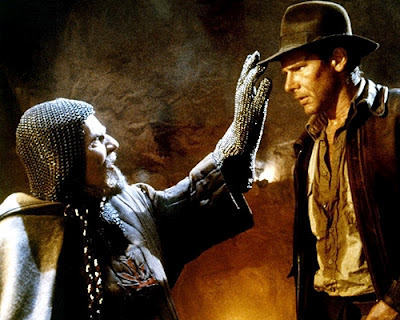 You're just going to leave me here without asking any questions about the fourteenth century? I oughtta box your ears!
You're just going to leave me here without asking any questions about the fourteenth century? I oughtta box your ears!
Published on September 24, 2012 00:36
September 22, 2012
World Rhino Day -- Five Species Forever
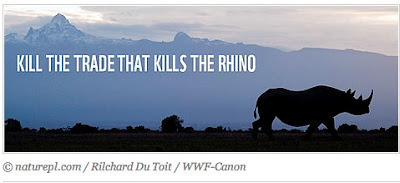
I've been fascinated with rhinoceroses for some time now. They're majestic, their babies are extraordinarily adorable, and the ones I've met exude an incredible sense of calm. They have no natural need for or interest in humans, and yet when kind humans and rhinos get together, beautiful relationships develop.
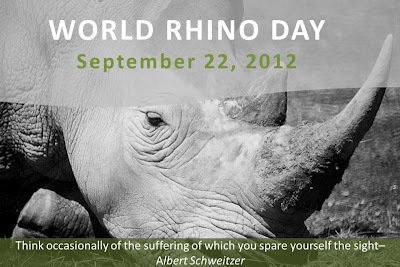
Rhinos are also endangered, because it's not always kind humans who come into contact with them. I cannot comprehend why anyone would want to harm a rhinoceros. Two of the stories in my new rhinoceros anthology inevitably deal with this issue. "Rhinoceros Dreams" and "A Business Venture in Glue" have been previously published, so today I would like to discuss the inspiration and intent of "Not Extinct Yet." It ties in beautifully with the theme of this year's World Rhino Day: Five Rhino Species Forever.
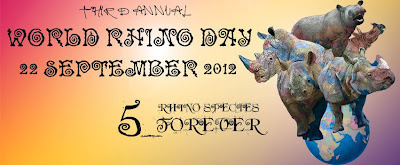
I came up with the idea for "Not Extinct Yet" through a writing prompt that asked for a story about bringing an extinct species back to life. I thought, "Wouldn't it be easier just to not let them go extinct in the first place?" Of course, if I was going to write about that issue, I felt a strong pull to write about my beloved rhinos.
I wanted to give rhinos a voice among humans, and I decided the easiest way to do that was to literally give them a voice. In the alternate world of this story, many different species of mammal are found to be capable of human speech. Some editors have made a weird assumption that the rhinos in this story represent some aspect of human society. Nope. They represent rhinos. I've always been a literalist.
The human protagonist, Suzanne, heads the team that discovers rhinos are one of the species that can talk. She makes friends with several crashes of white rhinos and black rhino individuals while she lives in South Africa and takes on their cause as her own. Through up and downs, laughter and tears, she finally solves the problem by asking the rhinos what they think would help them the most. At the risk of spoiling, the story ends happily. It's more or less my personal blueprint for the way I hope the future will go for the five rhino species in this world. It's optimistic and probably naive, but it's my story, my world, and things happen (almost) exactly the way I want them to. The real world is a different story, but we can still make decisions to influence the outcome.
Let's have Five Species Forever. Let's not allow any one of them to fade away.
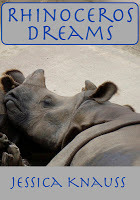 Read excerpts of "Not Extinct Yet" here, here and here. Get the anthology at Amazon or Smashwords. Thank you for supporting rhinos by reading these stories!
Read excerpts of "Not Extinct Yet" here, here and here. Get the anthology at Amazon or Smashwords. Thank you for supporting rhinos by reading these stories!
Organizations spreading the word and helping all five species hang around:
http://www.worldrhinoday.org/
https://www.facebook.com/WorldRhinoDay
http://www.rhinoconservation.org/
http://www.savingrhinos.org/
http://www.fossilrim.org/index.php (I've been here. It's amazing!)
http://www.rhinokeeperassociation.org (Don't forget to buy your rhino 2013 calendar in support of the Sumatran rhino here)
http://www.rhinoresourcecenter.com
Highly recommended rhino nonfiction books:
The Last Rhinos by Lawrence Anthony and Graham Spence
The Soul of the Rhino by Hemanta Mishra
Published on September 22, 2012 00:22
September 19, 2012
Don't Forget the Rhinos
September is such a full month! Lest we forget:
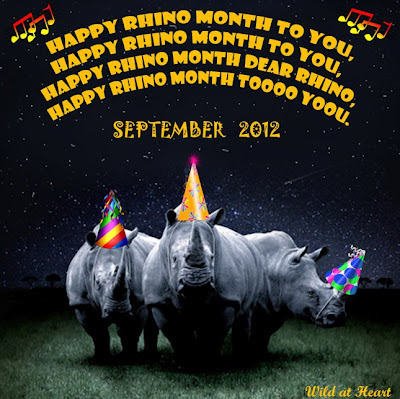
And, on a more serious note:
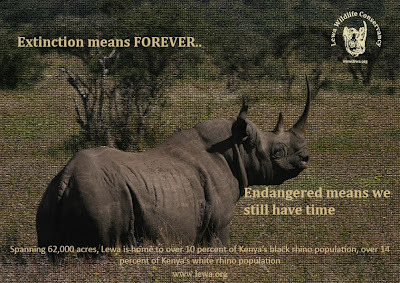
And to motivate:
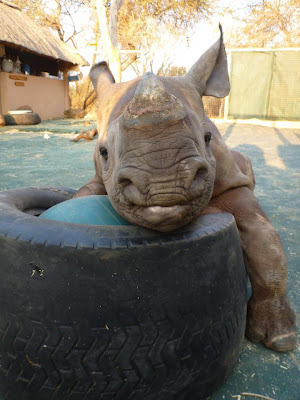
Who would want to harm such a cutie?
Tune in on Saturday for my tribute to World Rhino Day! It's fun.


And, on a more serious note:

And to motivate:

Who would want to harm such a cutie?
Tune in on Saturday for my tribute to World Rhino Day! It's fun.
Published on September 19, 2012 00:25
September 17, 2012
The Map of the Sky by Félix J. Palma
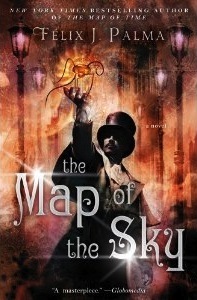 As I write more reviews, I realize that my favorite books are the devastating ones. The Map of the Sky by Félix J. Palma is devastating almost from the first page. So many times hope raises its meek head only to be struck down by ineffable powerlessness. I don't read sci-fi or horror, and some of the scenes are so terrifying that I sometimes wondered what I was doing reading this thing. Answer: I was compelled. The book addicted me completely and -- I'm not sure if it's because of the length or in spite of it -- I never wanted it to end. In this book the reader witnesses the complete genocide of earthlings, and yet the universe is full of awe, so that, like Emma, I want to look at this "map" and savor its imagination.
As I write more reviews, I realize that my favorite books are the devastating ones. The Map of the Sky by Félix J. Palma is devastating almost from the first page. So many times hope raises its meek head only to be struck down by ineffable powerlessness. I don't read sci-fi or horror, and some of the scenes are so terrifying that I sometimes wondered what I was doing reading this thing. Answer: I was compelled. The book addicted me completely and -- I'm not sure if it's because of the length or in spite of it -- I never wanted it to end. In this book the reader witnesses the complete genocide of earthlings, and yet the universe is full of awe, so that, like Emma, I want to look at this "map" and savor its imagination.The plot itself is a virtuosic piece of mapping out a story. I could never tell exactly where it was going (and I just love that), but in the end the pieces fit together so well I thought I must have been distracted not to see that that was how it was going to turn out. I haven't read the first book, The Map of Time (but I will now, as soon as I can), but the references to the events of the first book were easily understandable in terms of plot.
Criticism? Perhaps one could say the female characters aren't well developed, but if you think about it, the males aren't that developed, either. Rather, the characters represent different concepts, as witnessed by a couple of different characters commenting on the "roles" they and their companions play during these crucial events. The represent things like love, the ability to dream, hope, strength, and also their corresponding opposites as well as the human capacity for redemption. The ending especially proved that the author knows real love. Some readers (those who haven't really loved) will probably find that the end rings a bit false, but it resonated strongly with me. Tied up in the philosophizing about love is something I've never seen before, which is a logical conclusion about what time travel would mean to the traveler, and that was simultaneously a delicious mental exercise and another devastating emotional experience.
It's clear that Palma and his able translator Nick Caistor love books from the Victorian period. The language is very much of this time, which some readers might find boring or impenetrable. I thought I would be one of those readers, but I wasn't. I couldn't resist a book in which H. G. Wells has the opportunity to speak with Edgar Allan Poe or Charles Dickens or -- well, I won't say any more, so as not to spoil it. This was one of those books my husband was astounded to see me read, and possibly more astounded as I told him about all the incredible occurrences and exciting ideas in it. If you're like me, you'll want to be in a discussion group for this one.
I take comfort knowing that in some alternate universe, I translated this book for the English-speaking market, and in another, I wrote the original version.
Published on September 17, 2012 00:49



